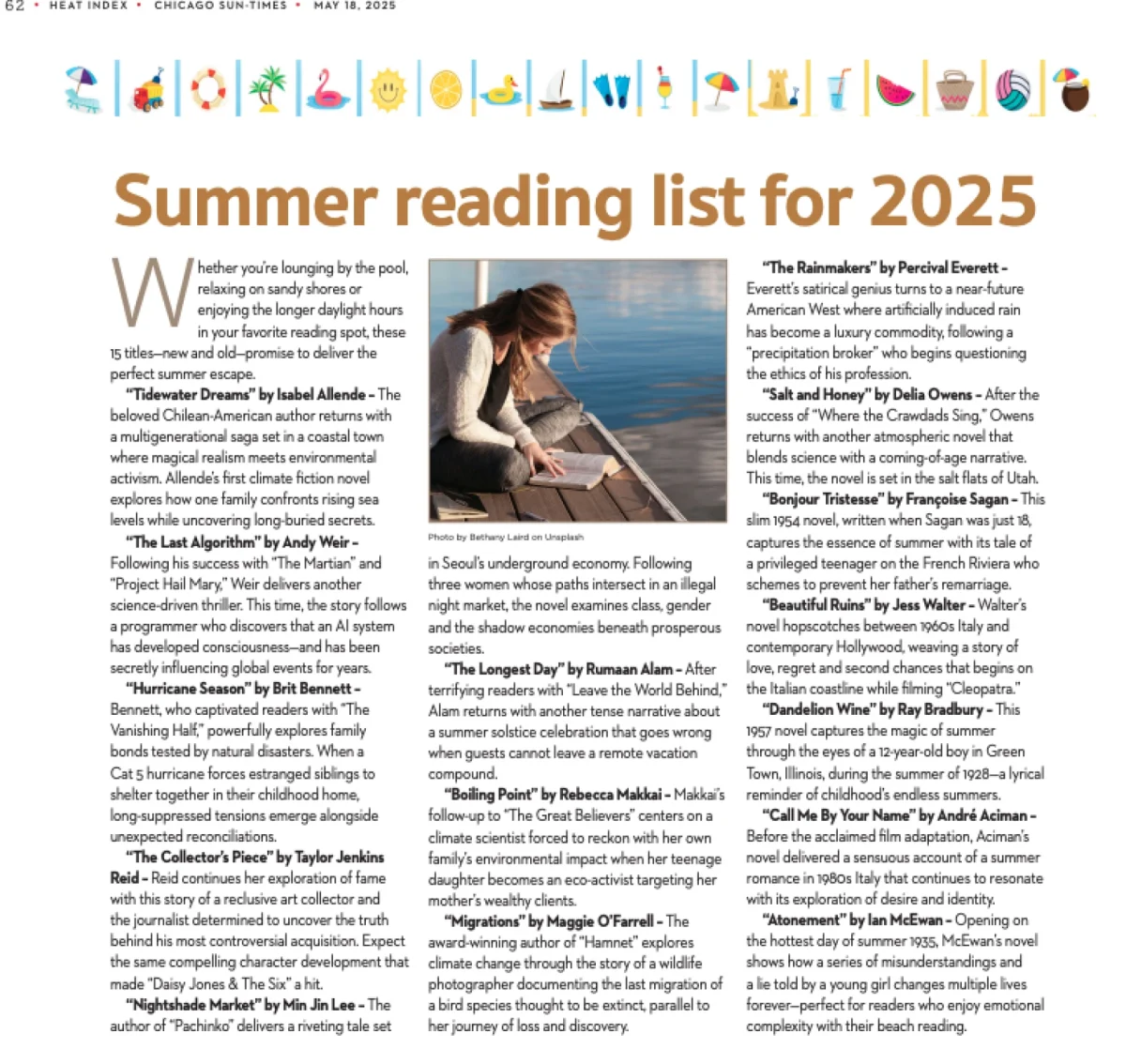Chicago Sun-Times Apologizes to Readers for AI-Created Summer Reading List That Was Mostly Nonexistent Books

Screenshot via Chicago Sun-Times.
The Chicago Sun-Times had to issue a humiliating mea culpa on Tuesday after a summer reading list was revealed to contain mostly nonexistent, AI-generated book titles — and it was apparently not the only AI-incited error in that section of the paper.
A special 64-page section of the Sun-Times published Sunday was titled “Heat Index: Your Guide to the Best of Summer.” One of the featured pieces — published without a byline — had a list of fifteen books both “new and old” that “promise to deliver the perfect summer escape” for readers.
The problem was that the majority of the books on the list simply do not exist.

Screenshot via Chicago Sun-Times.
For example, legendary Chilean-American author Isabel Allende is 82 years old and continues to write new books. Her latest, Mi nombre es Emilia del Valle (My Name Is Emilia del Valle), was published this month, and her first children’s book, Perla the Mighty Dog, was released in 2024.
However, Allende has not written a book called Tidewater Dreams. No such book of that title is listed on her website or on popular bookselling platforms. Searching for “tidewater dreams” on Amazon now has “tidewater dreams by isabel allende” in the autocomplete suggestions but clicking that search just brings up other Allende titles.
All but five of the article’s books were imaginary. The authors are real, but they have never published anything resembling either the title or description found in the Sun-Times article.
The five that are real — the last five on the list — are all older books, published between 1954 and 2012, and include iconic works like Françoise Sagan’s Bonjour Tristesse and ones that have been made into acclaimed films like Call Me By Your Name and Atonement.
The blurbs for the faux novels name real authors’ popular works and then mostly describe the new fake book as one that was written as a follow up to the authors’ previous hits. The article claims that Delia Owens, whose 2018 debut novel Where the Crawdads Sing was adapted into a movie produced by Reese Witherspoon, has “another atmospheric novel” that is set in Utah. Owens has not written any books set in Utah.
It did not take long for eagle-eyed readers to notice the proliferation of fake titles in the Sun-Times article and post complaints on Reddit forums and across social media.
View on Threads
The Sun-Times replied to several social media users that the paper was “looking into how this made it into print,” and added that the article was “not editorial content and was not created by, or approved by, the Sun-Times newsroom.”
We are looking into how this made it into print as we speak. It is not editorial content and was not created by, or approved by, the Sun-Times newsroom. We value your trust in our reporting and take this very seriously. More info will be provided soon.
— Chicago Sun-Times (@chicago.suntimes.com) May 20, 2025 at 10:17 AM
This response was met with skepticism and mockery and the paper soon posted an apology that included an acknowledgment that the article had been created with AI and not properly fact-checked.
According to the Sun-Times‘ statement, the article was “licensed from a nationally-recognized content partner” and “syndicated to the Chicago Sun-Times and other newspapers.”
“To our great disappointment, that list recommended books that do not exist,” the statement continued, and admitted that was caused by the use of AI:
Our partner confirmed that a freelancer used an AI agent to write the article. This should be a learning moment for all of journalism that our work is valued because of the relationship our very real, human reporters and editors have with our audiences.
At Chicago Public Media, we are proud of our credible, independent journalism created for and by people. And part of the journalistic process is a commitment to acknowledging mistakes. It is unacceptable that this content was inaccurate, and it is equally unacceptable that we did not make it clear to readers that the section was produced outside the Sun-Times newsroom. Our audiences expect content with our name on it to meet our editorial standards.
The statement added that the Sun-Times had removed the section from the online version and was “updating our policies” regarding third-party licensed content to transparently identify such content and make sure it “meets the same editorial standards as content we create ourselves” — as well as the expected move of “reviewing our relationship” with this specific content provider.
“We are committed to making sure this never happens again,” the statement concluded. “We know that there is work to be done to provide more answers and transparency around the production and publication of this section, and will share additional updates in the coming days.”
404 Media’s Jason Koebler tracked down Mario Buscaglia, whose byline was on many of the other articles in the summer special edition, and confirmed he was responsible for the reading list article — including the express admission that it was AI-created:
“I do use AI for background at times but always check out the material first. This time, I did not and I can’t believe I missed it because it’s so obvious. No excuses,” he said. “On me 100 percent and I’m completely embarrassed.”
Buscaglia added “it’s a complete mistake on my part.”
“I assume I’ll be getting calls all day. I already am,” he said. “This is just idiotic of me, really embarrassed. When I found it [online], it was almost surreal to see.”
The special section was also published in other newspapers, including The Philadelphia Inquirer, which posted its own statement from editor and senior vice president Gabriel Escobar calling the use of AI to produce content a “violation of our own internal policies and a serious breach.” Like the Sun-Times, the Inquirer stated its staff had “no involvement in the editing or production” of the “Heat Index” section and pointed a finger of blame at the content provider, King Features.
The Inquirer noted that the use of AI also violated King Features’ AI policy and had not been disclosed by the “freelance content creator” who submitted it, adding that King Features “will no longer work with the creator.”
Unfortunately for the Sun-Times, and other papers caught with AI-generated egg on their editorial pages, this summer reading lists seems to not be the only AI content in this section.
Journalist Joshua Friedman found several examples, including an article on “America’s growing hammock culture” that mentioned a seemingly fictional professor at the University of Colorado saying a quote about hammocks on college campuses that no one seems to have ever said and another quote supposedly from a 2023 magazine interview with a van life author who is a real person but again, never said the quote.
Later Tuesday, the Sun-Times posted another article about the AI kerfuffle written by Dan Mihapoulos, an investigative reporter for WBEZ, which is part of the same parent company, Chicago Public Media, as the Sun-Times. Mihapoulos reported that the incident had exposed the newspapers that had published the special section to “widespread public mockery,” and quoted Buscaglia giving additional apologies for “stupidly” just republishing AI content and expressing his regrets that other journalists were “catching shrapnel” for his failure to vet the content.
UPDATE May 21, 2025 1:15 pm ET: The Sun-Times Guild provided the following statement to Mediaite regarding the AI-created content:
The Sun-Times Guild is aware of the third-party “summer guide” content in the Sunday, May 18 edition of the Chicago Sun-Times newspaper. This was a syndicated section produced externally without the knowledge of the members of our newsroom.
We take great pride in the union-produced journalism that goes into the respected pages of our newspaper and on our website. We’re deeply disturbed that AI-generated content was printed alongside our work. The fact that it was sixty-plus pages of this “content” is very concerning — primarily for our relationship with our audience but also for our union’s jurisdiction.
Our members go to great lengths to build trust with our sources and communities and are horrified by this slop syndication. Our readers signed up for work that has been vigorously reported and fact-checked, and we hate the idea that our own paper could spread computer- or third-party-generated misinformation. We call on Chicago Public Media management to do everything it can to prevent repeating this disaster in the future.
New: The Mediaite One-Sheet "Newsletter of Newsletters"
Your daily summary and analysis of what the many, many media newsletters are saying and reporting. Subscribe now!






Comments
↓ Scroll down for comments ↓